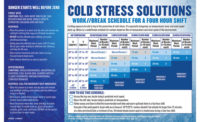Superman doesn’t sweat. It’s something I recently found out. It doesn’t make sense to me, but I guess that when you’re pretty much invulnerable and you shoot laser beams from your eyes, it’s no surprise that he doesn’t overheat. For us mere mortals, we need to deal with the everyday occurrence of being susceptible to extreme temperatures.
The most notable effects of higher temperatures to the body are sweating, exhaustion, body aches and a general sense of malaise. In extreme circumstances, exposure can even result in death.
Heat is all around
Let’s start at the beginning. Literally. There’s a big ball of fire about 92 million miles away from us that radiates enough heat to warm us all. For those of us working outdoors doing anything from construction, to landscaping, to being a lifeguard, the sun will be the primary heat source. Depending on the job, there will be additional sources emitting heat, such as power tools, vehicles, and even other people. As the sun beats down, the ground warms up as well, giving off heat from below as well.
For workers inside a plant, especially those working near actual ovens and furnaces, the heat radiating off these items, for lack of a better term, bakes them. If the worker comes in physical contact with the warmer surfaces, conductive heat will also become a factor in increasing heat stress.
As everything heats up around the individual, the individual will begin heating up as well. The average human being maintains a core temperature around 37oC (98.6oF). In order to maintain a constant internal temperature, much like a computer, the human body needs to vent out the heat. We do so by increasing blood flow to the skin and sweat production.
Decrease in blood flow to skin
A large factor in heat stress when performing physical labor stems from the fact that rather than having the blood flow to the skin to give off excess heat, the blood is being directed towards the muscles. During physical activities, muscles require an increased level of oxygen. Without it, the body will build up lactic acid, causing a painful burning sensation. The resulting decrease in blood flow to the skin will ultimately lead to the body storing more heat.
Without the ability to cool down, the body will continue to store heat, thereby raising the internal temperature. The most recognized effect is loss of concentration and inability to focus on a task. NASA's heat stress report CR-1205 found that temperatures over 80°F have a marked NEGATIVE effect on both the productivity and accuracy of work. At 95°F the report showed that study participants were found to make 60 mistakes per hour. That's one mistake every minute.
These inefficiencies can be quite costly, and even dangerous when lack of focus leads to accidents. When taking this into consideration, the financial expense to the company to remedy the situation are often less costly than the outcome of doing nothing.
More serious events will occur if steps are not taken to lower the core temperature. Fainting, heat exhaustion, heat stroke, cramps, heat rash, and even death.
Knowing everything that can happen if left unchecked, the following basic measures should always be put in place:
- Proper hydration: It is important to replenish fluids as the body will sweat to accelerate heat loss. Depending on the individual, electrolytes may be a necessity. Always remember, if you’re thirsty, drink!
- Take breaks: One of the best ways to cool down is to move to a cooler, more shaded location.
- Reduce the work load: Less can be more when done properly. This step can help with keeping blood flow directed towards the skin’s surface rather than the muscles.
- Wear the proper attire: Choose lighter colours, lighter weight fabrics and cooling apparel. When exposed to the sun, wear appropriate headwear that provides shade.
- Education: It is imperative that each individual knows how to recognize the symptoms of heat stress, and how their body reacts. Fatigue, heavy sweating, dizziness and nausea are some of the primary indicators.
When it comes to heat stress, safer working conditions will normally lead to higher output, better overall morale, and less employee turnover. Put together, that leads to a more profitable company, and a better workplace. While we may be affected by heat, at least kryptonite isn’t a factor.



